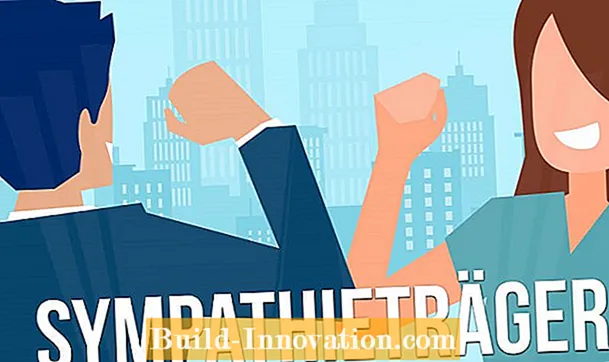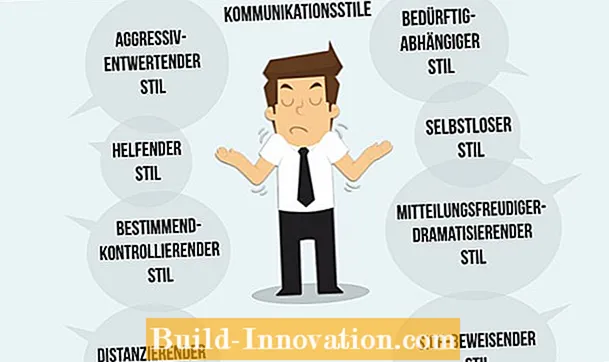Smile: meaning, benefits, tips

Content
- Meaning: What a smile says
- Why do we smile so little in everyday life?
- Good reasons to smile more often
- Smiling is really contagious
- Learning to smile: this is how the perfect smile works
- The different types of smiles
- Tips to put a smile on people's faces
It sounds like a truism: smile helps! What parents and friends advise in difficult times actually works. Scientists have long been able to identify numerous advantages that can be attributed to the smile.
The power in a smile can not only bring more happiness and satisfaction, but also has tangible advantages in social interaction and even in professional career. Numerous good reasons to smile.
Nevertheless, it is also evident time and again that people smile too seldom. Instead, long faces and first expressions everywhere. We explain what meaning a smile can have, which one advantages brings a smile and what the perfect smile looks like ...
Meaning: What a smile says
The smile is a universal signal among people. It is understood, interpreted and read all over the world. Even babies smile and don't have to learn this physical reaction. Regardless of the culture and society, the original meaning of a smile is the same: it stands for friends, a good mood, it shows openness and trust in the other.
At least this is true of one honest smilethat comes from the heart and is meant seriously. For example, a fake smile can be a sign of deceit, malice or malicious glee - more on this below under the different types of smiles. A smile can also mean insecurity or nervousness, especially in unpleasant situations in which a person does not know exactly how to behave, he often begins to smile.
So the meaning of a smile can vary depending on the situation - but most people have a very good sense for how sincere the smile of the other person is and can interpret whether it is genuine joy or hypocrisy.
Why do we smile so little in everyday life?
Children are a constant source of joy. And they also show that to the outside world. British researchers have found that children smile around 400 times a day and laugh up to 150 times. Unfortunately, the studies also show that over the years the smile is lost more and more. Adults smile on average only 15 more times and they only manage to laugh heartily 6 times a day. With around eight hours of sleep, that's not even a smile per hour.
Everyday life - a single tragedy.
There are many reasons for this. For one, with adulthood comes the Seriousness of life. Much more responsibility is carried, expectations have to be met and worries have to be endured. As the pressure increases, it becomes increasingly difficult to smile.
In addition, remains less time for free time, hobbies and the things that are especially great fun (you can read more about humor and what people laugh about in this PDF). Instead, the day is spent with professional and private obligations, which can certainly trigger and fulfill joy, but which make you laugh much less often
Also in the job is professionalism asked. A good mood may have some advantages, but those who constantly smile and laugh to themselves are quickly under the general suspicion of not taking their job seriously enough. Some managers even believe that these employees are distracted, negligent, or lazy.
In addition, Duisburg researchers were able to show that the higher the smile, the less people smile Status and the hierarchy level is. In management positions it becomes rarer, the further up you look, the more petrified the mines.
It is accordingly serious in many companies. A fatal misconception, because a positive working atmosphere, in which people smile and laugh a lot, has several advantages: Employees are more motivated, more productive and more loyal to their own employer. Both professionally and privately, adults should at least stay a little child and learn again to smile more often.
Good reasons to smile more often
Smiling has many positive effects that you can benefit from. In the following list we have therefore summarized good reasons why you should smile more often:
- Smiling immediately puts you in a good mood
Smiling is not only an expression of joy, but also a trigger. Researchers have been able to show in various studies that a smile immediately makes you happier and a better mood. Particularly astonishing: our brain does not care whether there is a reason to smile at all - behind this is the so-called facial feedback hypothesis. Even if you just smile to yourself for no reason, you will feel better. The muscles involved in the smile signal to the gray cells one way or another that they are grinning, whereupon they release happiness hormones. - Smiling makes us learn and remember better
The effects of a smile are often underestimated or wrongly limited to joy and satisfaction. In fact, smiling can even improve your learning skills. This was the result of a study at Marquette University in Wisconsin. The researchers showed that participants who laughed 30 minutes after a learning process were better able to remember what they learned. Japanese studies also came to a similar result, in which test subjects in a memory game showed significantly better memory ability if they had laughed vigorously beforehand. - Those who smile are better remembered
Not only will you remember something better yourself, other people will remember you much better when you smile. Because it is not our nose, a birthmark or the curve of our lips that makes it particularly striking - it is above all the smile. In other words, if you want to be remembered, smile! Scientists working with Arnaud D’Argembeau and Martial Van der Linden have investigated this and were able to confirm it in several tests: the test subjects consistently remembered the happy, smiling likenesses better, although they only saw the faces for a few seconds. As soon as they tried to memorize abnormalities such as a particularly pronounced nose or an intelligent facial expression, they remembered noticeably worse. - Smiling makes you more personable
You can easily observe this effect yourself in everyday life. Look at different people around you: some who smile, some who look straight. Who do you like more straight away? Just! A smile speaks to other people, signals openness to communication, honesty and trustworthiness. In addition, people who smile more often increase the reputation of their fellow human beings and are recommended more often by them. - Smiling relieves pain
On the one hand, the endorphins released when you smile create feelings of happiness, but they also have anti-inflammatory, analgesic and anxiety-relieving effects. If you suffer from slight pain, you can smile away, so to speak! It even works preventively: A study at the University of Zurich found that laughing even half an hour after watching a funny film leads to a higher pain tolerance. - Smiling makes you creative
The brain rewards joie de vivre with increased thinking power and new perspectives. This is the result of studies by the University of Toronto. Compared to control groups, smiling and good-humored test subjects had a significantly increased ability to absorb and analyze, and performed better in creative tasks. Other studies have shown that good-humored colleagues bring almost twice as many suggestions for improvement and good ideas to their companies. - Smiling improves job chances
A decision has to be made in application processes, and often only small details make the difference. Identical training, comparable work experience, similar soft skills. Here the confirmation is given as to who makes the better impression personally. The smile plays a major role: In addition to the sympathy points, a self-confident smile also appears competent, determined and ambitious. This can be used to save the last points for the job. - Smiling increases your chances of advancement
Alice Isen, a psychology professor at Cornell University in New York, showed in her studies that there is a connection between professional success and a good mood. In her results she came to the conclusion that good-humored colleagues are not only more popular and popular - which in itself is a professional advantage - but are also better rated and promoted more often by their superiors. In addition, the smiling employees achieved a higher salary on average. - Laughing intoxicates
And quite comparable to a drug. That is what Dean Mobbs from Stanford University found out (PDF). When looking at funny comics, a special activity of the nucleus accumbens measured - this part of the brain controls, among other things, the release of the so-called happiness hormone dopamine and thus creates a certain euphoria when laughing and is also responsible for making people who consume cocaine feel high and intoxicated. - Those who smile stand out from the crowd
It's easy to get lost in a crowd and go unnoticed. A simple trick on the other hand: smile and show your teeth! Psychologists working with Gernot Horstmann from Bielefeld University have found that when we scan a cluster of people, we notice more of those people in the crowd whose teeth are visible. This so-called face-in-the-crowd effect is based on a human instinct to quickly distinguish between friend and foe. Whoever smiles is a friend and therefore not a danger. The effect therefore also works on faces that show their teeth distorted by anger. These are also particularly noticeable. - Smiling extends life
Scientists from the University of California at Berkeley analyzed (PDF) in a long-term study the college yearbooks or the portraits of the women in them and how much they smiled - only vaguely or with a broad grin to radiant. 30 years later, the evaluation showed that the group with the beaming smile was mostly happily married and showed maximum values in physical and mental health.Another study at Wayne State University in Michigan looked at smiles in photos of baseball players. The long-term analysis showed an astonishing difference in life expectancy: Those who did not smile lived an average of 72.9 years, a slight smile increased the average to 75 years and those who showed a genuine and warm smile had a life expectancy of 79, 9 years.
All of these good reasons speak for themselves important motto to take to heart:

Smiling is really contagious
It started on a Tuesday. More precisely: on January 30, 1962. As every day, the three girls were at school in Kashasha on the west bank of Lake Victoria. Then suddenly they started to laugh. First one, then two, then all three. They couldn't stop at all.
At first the teacher thought it was funny, then she got angry, laughing disrupted the class. She sent the three to the door. But it didn't help, they kept laughing.
And what's more, you infected others with it. Within a short time, 95 of the 159 students laughed - and never stopped, which is why the school had to close on March 18th. Huge mistake!
The laughing students infected even more people: Ten days later, 200 people in Nshamba, around 90 kilometers away, started laughing, mostly students. In the regional capital Bukoba, on the other hand, 48 out of 154 schoolchildren were already laughing.
That is why the school was closed there too - and the Laugh epidemic spread to Kanyangereka, 35 kilometers away, where two schools had to be closed as a result.
The whole laugh epidemic lasted several months and brought more than 1000 people over and over again Fits of laughter until the laughter slowly subsided. The phenomenon went down in history as the Tanganyika laugh epidemic. The cause of this has never really been clarified.
However, scientists suspect one is behind it natural reflex: As soon as positive emotions come into play, our brain tends to imitate them. Just the sound of laughter triggers a reflex in part of the cerebral cortex (which controls the facial muscles) to at least prepare us to laugh along, discovered Sophie Scott from University College London.
Laughing or cheering is a particular solution strong reactions out, stronger than fear or disgust - from which the researchers deduce that positive emotions are more contagious than negative ones. Incidentally, this is a finding that sitcom producers regularly take advantage of by pre-produced salmon volleys (Industry jargon: canned laughter) in your broadcasts.
"Nothing in the world is as contagious as laughter and a good mood", however, the writer Charles Dickens already knew.
Learning to smile: this is how the perfect smile works
Actually it's social Innate smilewhich is why even babies have a cute smile on their faces. With the very little ones, this also happens unconsciously during sleep. From Angel smile one speaks there.
However, a natural smile is not easy for everyone - there are two extremes. Some show a completely exaggerated smile, which automatically looks put on. Others are much more cautious and cannot get beyond a slight twitch of the corners of their mouths. Both are more disturbing than positive, open and warm to the viewer.
Incidentally, the French physiologist Guillaume-Benjamin Duchenne first made the distinction between a posed and a real smile, which is why with a real smile also from Duchenne smile the speech is. Not only do the muscles around the mouth tighten, but also around the eyes, as long as the unanimous opinion.
However, this theory has now been refuted: When you laugh, the wrinkles in the corner of your eye only say something about the intensity out, but by no means whether the laughing person is seriously happy or amused, or just wants to pretend something.
This is (according to researchers) perfect smile the exact mediocrity and apparently not that difficult. Are crucial for it three points for the smile:
- Mouth slightly open
The mouth should be slightly open for the perfect smile - but please not too wide. The teeth should be easy to see, but you don't have to be able to look right down your throat. - Raised corners of the mouth
With a perfect smile, the corners of the mouth are visibly lifted. This applies to both sides, so the corners of the mouth are moved symmetrically upwards. - Authentic expression
This cannot be forced, but it is the most important factor for a perfect smile: You have to really mean your smile in an authentic way, then it will be just as well received by those around you.
You will immediately appear likable, even to people who have never been strangers to you. It is not for nothing that it is said:
The shortest distance between two people is a smile.
However, not everyone is born to be a charm. Some people are more likely by nature shy and introverted; they find it difficult to open up to strangers and show a smile.
So why not learn a little about the smile work your own sympathy values and do something for your wellbeing at the same time? To get started, try these exercises:
- Go to a quiet place where you can be completely relaxed and undisturbed just by yourself.
- Look in a mirror. Now try different grimaces - a big grin, you might be sulking too, stick your tongue out yourself, draw your eyebrows together - all of which will help relax the muscles of the face. At the same time, you can see how many muscles you actually have on your face.
- Look into the mirror and register your relaxed face.
- Arouse positive feelings in yourself, for example by thinking of something funny or something beautiful.
- As you go through different situations in your mind, watch yourself: Is there a smile on your face?
- Smile at each other kindly.
By the way, these exercises also have something to offer Self acceptance to do: The more we accept each other, the more likely a stranger can accept us. Either way, a smile is an expression of communicative and social skills.
The different types of smiles
In body language, small subtleties can make a big difference. This also applies to smiles, because the following applies here: not every smile is the same. Correspondingly, it can be difficult to correctly interpret the smile of your counterpart.
On the one hand, you don't want to accuse anyone who's just giving you a smile. At the same time, it doesn't help if you are too naive and only look at every smile positively. We have listed different types of smiles that you should distinguish:
- Honest smile
That's the kind of smile you want to see and show to others when you're happy. An honest smile shines over the entire face and is also reflected in the joyful eyes. The corners of the mouth are raised - in some people very strongly, in others only a little. With an honest smile, the mouth is usually slightly open. - Fake smile
Anyone who wants to fool others puts on a fake smile. In this case, the corners of the mouth are slightly raised, but tend to pull outwards. The mouth is closed and the lips are placed on top of each other. There is no false smile in the eyes, they can still look disinterested or dismissive. This type of smile is put on out of mock politeness, but also out of shyness. - Sneaky smile
Everyone knows this type of smile: it looks almost nasty, and the person with a sneaky smile seems up to something. As with a fake smile, the mouth is closed, but the lips are pressed closer together. The corners of the mouth can be slightly raised, but the eye area is drawn together. - Dominant smile
Power, superiority and a higher status are expressed through the smile. It expresses that someone thinks they are better or at least higher up. This person smiles down from above. This type of smile usually only pulls up one corner of the mouth while keeping the lips closed.
Tips to put a smile on people's faces
Charlie Chaplin once said: Every day that you don't smile is a wasted day. You should internalize this principle and do it regularly Celebrate smiles. But why only enjoy it for yourself when you can help put a smile on people's faces?
There are lots of little things that you can do with Give your fellow human beings a smile can. Get started today and try it out:
- Make an honest compliment
Do you like your friend's new hairstyle or a colleague's new suit fits like a glove? Then pay a compliment! Hardly anything brings a smile to light faster than honestly meant recognition. Honesty is crucial, because hypocritical and lying compliments have the opposite effect and you can be sure that your fellow human beings will notice the difference. So take heart and hand out compliments - there are plenty of opportunities to do so. - Thank others
Even children learn the importance of a simple one You're welcome or thanks can be. Remember it and say thank you to those around you. Always remember that when someone thanks you for a small good deed, you too will feel better. The next time someone holds the door for you, waits for you in the elevator or a colleague brings you an ice cream, thank them from the bottom of your heart. - Make a seemingly gratuitous gift
Remember: You can also give gifts outside of birthdays and Christmas. And even more popular at unexpected times. Bring flowers to your wife on the spur of the moment. Could there be a better reason than trying to put a smile on her face? The material value of such a gift is completely irrelevant, the gesture alone is decisive. - Restore an old contact
Sometimes in life you just lose sight of each other. Maybe friends' paths lead to another city and over time contact becomes less and less. Take the first step and pick up the phone. An easy Hey, we haven't heard from each other for too long, I'd like to change that as soon as possible is enough. As a reward for the initiative, you will hear the smile in your friend's voice. - Tell someone that you are proud of them
It is almost only known as a saying from parents to their child - wrongly. You can be just as proud of a friend who graduated or a colleague who gave a presentation to an important client. Do not be stingy with this sentence, but tell other people that you are proud of them when they achieve great achievements. - Offer your help
If you keep your eyes open, you will see situations every day in which you can offer your help to others. The colleague who gets stuck with his tasks or the classic of an older lady who carries shopping bags. Why wait for someone else to help when you can handle this part yourself? By being helpful you can give everyone a smile. - Meet everyone with a smile yourself
Finally, as a reminder, the easiest way to make others smile is through your own smile. Far too often we are preoccupied with ourselves, have no time or are elsewhere with our thoughts. Break through this behavior, occasionally leave your smartphone in your pocket and give those around you a happy smile. You will be surprised how positive the reactions are.



